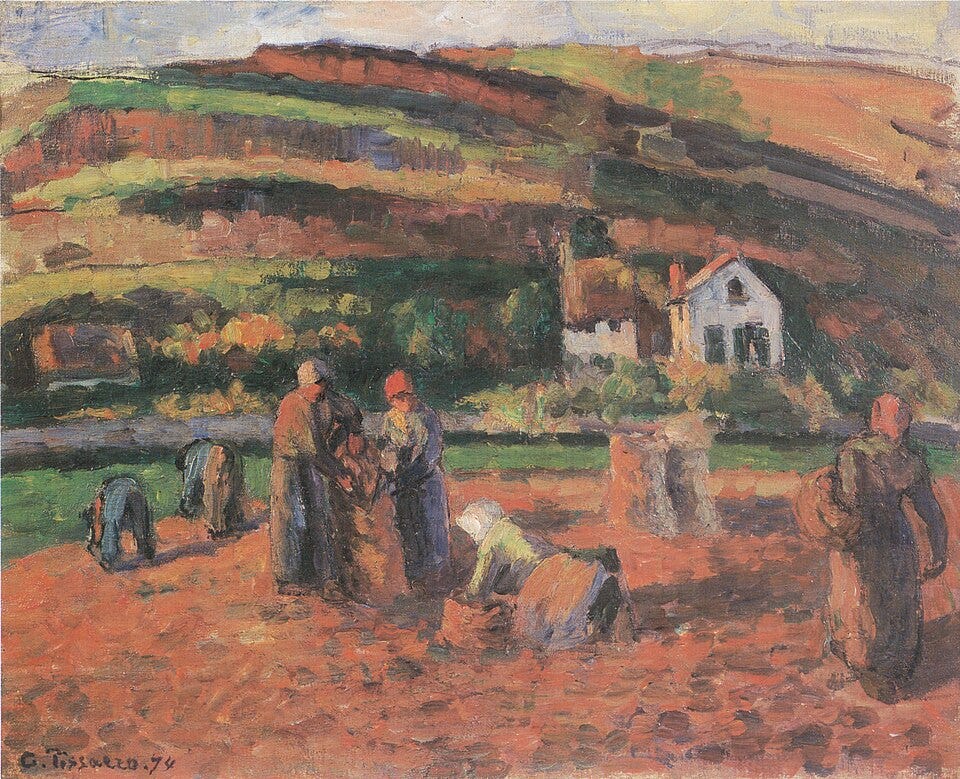I feel therefore I can be free
How emotions plant seeds for degrowth
You’ve probably felt it before, perhaps while picking up your groceries or on your commute to work—a strange sense of living a double reality. That uncanny awareness of the piles of plastic and poisonous emissions while “normal” life continues on, as if climate change were looming over your shoulder. More than individual discomfort, it points to something deeper in climate-complicit societies: the ecological crisis is emotionally and socially repressed. The queasy dissonance between the carbon-dense ways we live and the concern we feel haunts our everyday lives.
Emotions are central to our humanity—but they’re also inseparable from climate change.
Read more about: Erin Quigley | LinkedIn
This became abundantly clear when I conducted ethnographic research with a grassroots organization running climate conversation workshops. We gathered to learn and practice how to talk about climate change with others. As the facilitators described: Speak from the heart, not the head. They encouraged us to share personal stories using feeling words like “I feel worried because…”. We practiced asking how the other person feels, actively listening, and showing curiosity in understanding their experience. From there, the facilitators guided us to dig deeper, as there are always layers in conversations bubbling beneath the surface of what is spoken. Often, behind someone’s resistance is a form of self-protection. Even if someone truly cares about the situation we face, change can feel threatening. However, in providing a safe space within caring conversations, we can inspire people to open up toward meaningful change.
One core message rang clear: feelings, not facts, hold power for transformation. Rather than try to convince others what to do (nobody wants to be told what to do), the folks engaged in the workshops saw emotional connection as a deeper and more effective strategy for positive change. Through listening, empathizing, and sharing our own feelings, we plant seeds in others. And these seeds may just grow and lead to more seeds being planted, creating collective change right beneath our feet. As one facilitator put it, “climate conversations are a way of reaching the world”.
That emotions are a source for change is not new. Black feminists have long written about the radical potential of feeling for resisting oppressive power structures. As Audre Lorde illuminates in her iconic essay, Poetry is Not a Luxury:
“The white fathers told us, I think therefore I am; And the black mothers in each of us-the poet-whispers in our dreams, I feel therefore I can be free”.
Against the Eurocentric, colonial ideology that prizes logic and dismisses feelings, Lorde reminds us of the liberatory power of emotion. In the current state of the world, this is a much-needed reminder. Despite widespread, global concern about climate change, few people actually speak about it. We currently find ourselves in a spiral of silence, perpetuating a cycle that conceals collective distress and creates an atmosphere that discourages people from breaking that silence. It’s not for lack of solutions that we haven’t achieved the transition needed—it’s denial. Our societies refuse to truly acknowledge the reality unfolding before us.
Degrowth, with its powerful normative stance rooted in an ethics of mutual care has not yet fully reckoned with emotion. I suggest that attending to emotion is a critical degrowth strategy, one that could create profound change if we practice these empathetic climate conversation techniques. Emotional engagement, in this way, is a form of prefigurative politics—we enact the relational ethos we hope to see in the future.
Far beyond individual, psychological phenomena, emotions are social: they are learned, embodied, practiced, and performed. They are shaped by particular lifeworlds, environments and histories. Under late capitalism, feelings are commodified, exploited for profit, and instrumentalized for control.
Nonetheless, in my research, I found that climate emotions—anxiety, guilt, despair and hope—are more than mere reactions to the ongoing crisis. They are vehicles for sense-making that articulate our relationships with place, with one another, and with the planet. In other words, what we feel inside reflects our emotional entanglements with the world, human and not.
That is precisely why climate emotions are threatening to capital. In one of the latest attacks on science, the Trump administration cut millions in Princeton’s research on climate change in collaboration with the National Oceanic and Atmospheric Administration (NOAA). The reason? It produces “climate anxiety” among youth. The danger to business-as-usual is not rising sea levels, nor disastrous flooding, but rather the emotional distress of people.
This is good news.
All over the world, emotions are what fuel the movement that disrupts the core of the neocolonial, capitalist system driving the climate crisis. It couldn’t be more plain and clear. Our feelings rupture the silence and sound the call for better futures; for them, it is the sound of a death knell.
Emotional encounters open space for mutual recognition. They provide us with the threads to weave communities built on care, yet they also equip us with the tools we need to change the world. As feelings unsettle the foundations of extractive economies, degrowth can ride these turning emotional tides, gaining new momentum for economies centered on reciprocity and collective wellbeing. To return to Audre Lorde:
“When we view living, in the european mode, only as a problem to be solved, we then rely solely upon our ideas to make us free, for these were what the white fathers told us were precious.
“But as we become more in touch with our own ancient, black, non-european view of living as a situation to be experienced and interacted with, we learn more and more to cherish our feelings, and to respect those hidden sources of our power from where true knowledge and therefore lasting action comes”.



